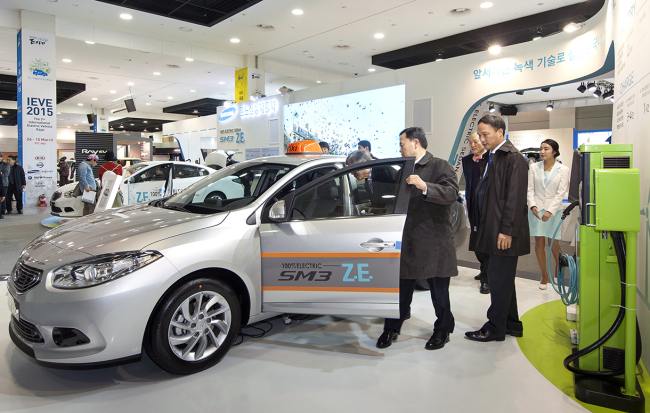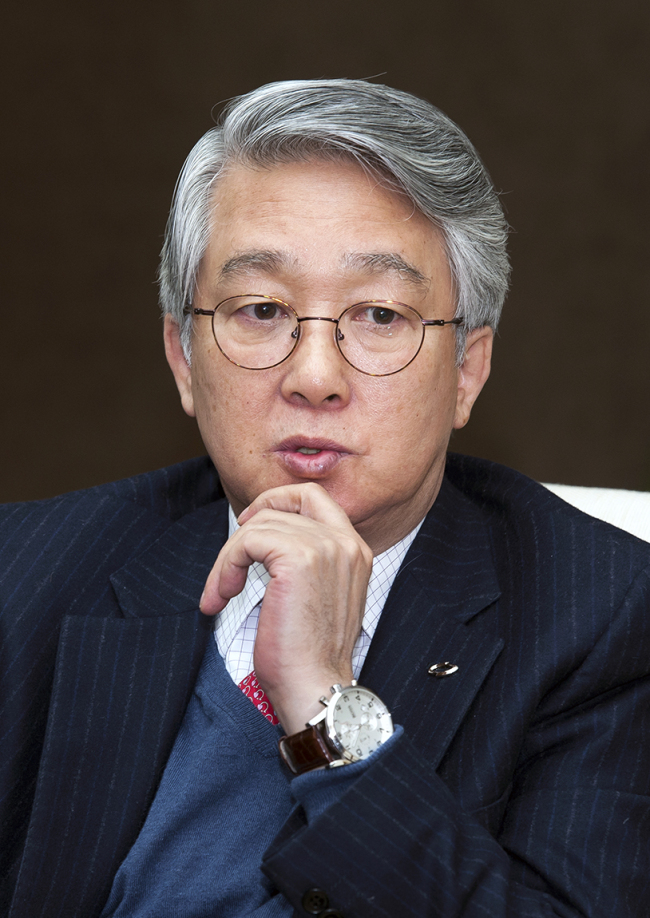SEOGWIPO, Jejudo Island โ Renault Samsung Motor, the Korean unit of French automaker Renault S.A., will enter the electric taxi market with the SM3 Z.E., its sedan-type EV, ahead of its rivals, in an effort to retake its market leadership in the local zero-emission car market.
SM3 Z.E. was the best-selling EV model in Korea in 2013, but was pushed into the second spot last year by Kia Motorsโ Soul EV.
โThe company plans to sell 1,000 units of the SM3 Z.E. nationwide this year,โโ said Park Dong-hoon, the executive vice president of Renault Samsung, during a group interview Friday at the 2015 International Electric Vehicle Expo on Jejudo Island. This amounts to one-third of the total volume that the Ministry of Environment will subsidize this year.
 |
| Visitors to the 2015 Jeju International Electric Expo take a look at the taxi version of the SM3 Z.E., Renault Samsungโs EV brand, Friday. (Renault Samsung Motor) |
โTo achieve the EV sales target, we will tap into the electric taxi market, with the only sedan-type EV in Korea,โโ said the executive, who is in charge of sales at Renault Samsung.
The automaker unveiled the taxi version of the SM3 Z.E. at the International EV expo on Jejudo Island, the biggest EV market in Korea.
โThe idea came from the fact that the introduction of zero-emission taxis could cut carbon dioxide emissions faster than passenger cars, given their much longer driving hours,โโ he said.
โIn addition, EV taxis will raise public understanding of zero-emission vehicles, which will contribute to the growth of the EV market.โโ
The automaker found that some 2.4 million people will be able to ride in an EV each year when 500 electricity-powered taxis are supplied.
 |
| Renault Samsung Motor executive vice president Park Dong-hoon |
This is why a growing number of cities in the world are pushing for the electrification of taxis. As a case in point, in 2014, New York City announced plans to make one-third of New York taxicabs electric by 2020. London started the test-driving of EV taxis from this year.
Renault Samsung is ahead of rivals in the EV taxi market, which is still in an early stage in Korea. Currently, Renault Samsung is running 10 EV taxis in Seoul and six EV taxis on Jejudo as part of a pilot project.
โWe have received positive feedback on the product quality from EV taxi test drivers,โโ Park said.
The taxi-version of the SM3 Z.E. can drive up to 135 kilometers on a single charge at a maximum speed of 135 kilometers per hour, with a maximum torque of 25.5 kg-m.
Renault Samsung found EV taxi drivers can save 20 to 30 percent on monthly operation costs compared to gas-powered taxis.
Policy support is critical to put more EV taxis on the road. One of the most important tasks is to set up power-charging facilities at a fast pace.
To solve the issue, Renault Samsung proposed installing a power-charging station at the workplaces of corporate taxi drivers nationwide.
โIn addition, we recommend the government develop a tailored rate system for electric taxis,โโ he said.
Despite a lack of infrastructure for the EV taxi business, Renault Samsung expects to sell more than 300 EV taxis this year.
While the Ministry of Environment supports passenger EVs, the Ministry of Trade, Industry and Energy will run a program for the creation of EV taxi and bus markets this year.
The Energy Ministry will run a battery lease program for 566 new electric taxis nationwide, and the Jeju municipal government will pay for the batteries for 290 of these.
โWe hope to win all the EV taxi orders, with the support of the Jeju administration,โโ Park said.
Renault will continue to step up its efforts to expand its EV market share in Korea, a strategic market.
โKorea, where world-class EV battery-makers like LG Chem and Samsung SDI are located, is forecast to further capitalize on the EV market development,โโ Park said. LG Chem supplies EV batteries to Renault Samsung.
The Korean electric car market, although still relatively small, has been rapidly expanding over the past few years, as last yearโs sales figure of 1,183 units was a 65.5 percent increase from the 715 units sold in 2013.
By Seo Jee-yeon (jyseo@heraldcorp.com)

